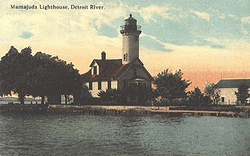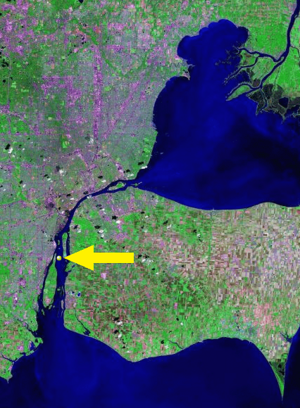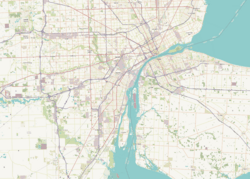Mamajuda Island facts for kids

The Mama Juda Lighthouse from a 1910 postcard
|
|
| Geography | |
|---|---|
| Location | Detroit River |
| Coordinates | 42°11′32″N 83°08′10″W / 42.19222°N 83.13611°W |
| Administration | |
| State | Michigan |
| County | Wayne County |
| Township | Grosse Ile Township |
| Demographics | |
| Population | Uninhabited |
Mamajuda Island, also called Mama Juda Island, was a small island in the Detroit River in the United States. It was located near the northern tip of Grosse Ile, which is an island in Michigan. Mamajuda Island was part of Grosse Ile Township in Wayne County, Michigan. It was known as the smallest island ever mapped in the Detroit River.
Contents
What Happened to Mamajuda Island?
Mamajuda Island used to be about 30 acres (12 hectares) in size. However, it slowly disappeared due to erosion. Erosion is when natural forces like water and wind wear away land over time. Today, only a few rocks from the island can be seen above the water when the water level is low.
Because of this, the island no longer has a set size. It cannot be used for any purpose. You might not find it on many maps anymore. But some very detailed online maps still show where it used to be.
The Mamajuda Island Shoal
Mamajuda Island was part of a larger underwater area called the Mamajuda Island Shoal. A shoal is a shallow area in a body of water. This shoal runs along the east coast of Grosse Ile. It is usually about 3 to 8 feet (0.9 to 2.4 meters) below the surface. The shoal stretches all the way to Grassy Island.
This area, including where Mamajuda Island once was, is now part of the Detroit River International Wildlife Refuge. This refuge helps protect the natural environment and wildlife in the Detroit River.

Why Was it Called Mamajuda?
The island was named after an American Indian woman. She used to camp on the island regularly during fishing season. This shows that the island was once a place where people lived and fished.
The Mama Juda Lighthouse
In 1849, a lighthouse called the Mama Juda Lighthouse was built on the island. A lighthouse helps guide boats and ships. The person who looked after the lighthouse, called the lighthouse keeper, and their family were the only people living on the island.
The lighthouse was rebuilt in 1866. However, the island's ground was not very strong. It was slowly worn away by erosion. In 1950, the lighthouse itself was washed away by the water. By 1960, the entire island had disappeared.
Even though the island is gone, the shallow shoal underneath can still be dangerous for boats. This is especially true for large lake freighters, which are big cargo ships that travel through the area often.
 | Shirley Ann Jackson |
 | Garett Morgan |
 | J. Ernest Wilkins Jr. |
 | Elijah McCoy |



